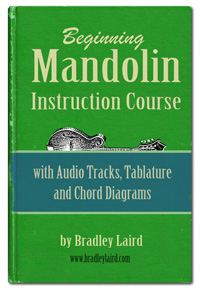| FREE
MANDOLIN LESSON 3 - by Bradley Laird

READING TABLATURE
As previously stated, the eight strings of the mandolin are tuned to
only four notes. They are tuned in pairs. The two smallest diameter
stings, closest to the floor are both called the first string and are
played as if they are one string. These two strings are tuned to an
E note. These strings, since they sound the same, are called a unison
and we will call it the first string.
In the diagram below, called tablature, you will see that there
are four horizontal lines. Each line represents one string
(one pair of strings) on the mandolin. Vertical lines divide
the tablature into bars or measures and are called bar lines.
Numerals
placed on the string indicate notes you are to play. In the first
measure you see that there are four notes.

Each note has a stem and these notes are called quarter notes because
there are four of them in each measure. The first measure shows
that you are to play 4 notes on the first string(s) and the numeral
indicates whether the note is played open or fretted. In this case,
all of the notes are played at the "zero" fret (which
means played open, or un-fretted). The first string is tuned to
an E note.
The second measure shows four quarter notes played on the open
second string. This string is tuned to a A note. The third measure
is played on the open third string and is a D note. The last measure
is played on the open fourth string and is tuned to a G note.
EXERCISE 1 - QUARTER NOTES
Play the following "open" quarter notes slowly, using downstrokes
of the pick. Count 4 beats (1-2-3-4) and then play the exercise
while striving for even, steady pick strokes.

Keep
in mind that a quarter note will get one beat. (These exercises are
written in what is called
4/4 time. This means each measure has 4 beats and a quarter note
gets one beat. We will discuss 2/4 and 3/4 time later.)
EXERCISE 2 - 8TH NOTES
Two 8th notes are equal to one quarter note in time value.
Two 8th notes get one beat. In this exercise, you will play
the quarter notes with a down stroke and the 8th note pairs with a
down/up stroke.

To
count this rhythm you would say "one, two and,
three, four and."
For
some additional instruction on reading mandolin tablature you might
enjoy watching my two part free "Reading Mandolin Tab 1" and "Reading Mandolin Tab 2" videos lessons.
I
have the gist of this... take me to lesson
4.
 |
Brad Laird's Beginning Mandolin Instruction Course
Click here for information about my downloadable PDF eBook which expands on the free lessons here on the site.
Larger tablature, more tunes and chords, printable full page format PLUS AUDIO TRACKS of all of the songs and exercises. |
| 






